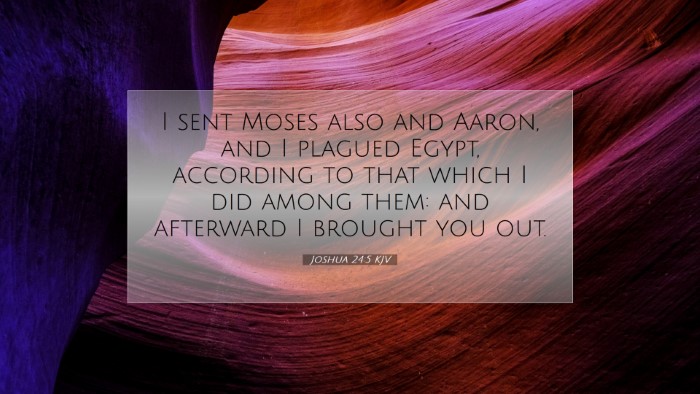Commentary on Joshua 24:5
Verse Text: "I sent Moses also and Aaron, and I plagued Egypt, according to that which I did among them: and afterward I brought you out."
This verse serves as part of Joshua's farewell address and a culmination of Israel's historical narrative, emphasizing God's initiative in their redemption and journey. The events described reflect both God's sovereignty and the gravity of His covenant with Israel.
Historical Context
This passage occurs towards the end of Joshua’s leadership, where he gathers the Israelites to renew their covenant with God. The recollection of events serves not only as a reminder of God’s faithfulness but also lays the foundation for Israel's commitment to Him.
Commentary Insights
Matthew Henry's Commentary
Matthew Henry emphasizes God’s proactive role in sending Moses and Aaron as His chosen leaders. He points out that the plagues inflicted upon Egypt were divine judgments meant to convince Pharaoh of God's supremacy.
- Henry highlights the significance of God's plagues as signs of His power intended to compel the Israelites to trust Him more fully.
- He notes the chronological order: sending Moses and Aaron follows God's covenant promises, reinforcing that divine deliverance is fundamentally rooted in divine choice.
- Furthermore, Henry underscores the concept of 'afterward,' denoting the shift from oppression to liberation, a theme central to the theology of salvation.
Albert Barnes' Commentary
Albert Barnes elaborates on the direct actions of God in history, showcasing His active engagement with humanity. He asserts that the plagues were a display of God’s sovereignty over nature and human authority.
- Barnes emphasizes that the phrase "I brought you out" encapsulates the essence of God's redemptive plan - He is the initiator of salvation.
- He interprets the plagues not merely as judgments but as a means of solidifying Israel’s identity, distinguishing them as God's chosen people from the Egyptians.
- Barnes also reflects on the significance of leadership (Moses and Aaron), suggesting that God uses human agency to fulfill His divine purposes.
Adam Clarke's Commentary
Adam Clarke offers a more analytical view, breaking down the text to expose its theological and practical implications. He points out the historical significance of God’s deliverance in light of the covenant established with Abraham, Isaac, and Jacob.
- Clarke stresses the importance of remembering God's past acts as a basis for faith in present and future trials.
- He discusses the role of notice in “I plagued Egypt,” suggesting it serves as a warning against disobedience and rebellion, underscoring God's justice.
- Clarke highlights the continuing theme of God's faithfulness to His people, affirming that acknowledgment of His acts inspires trust and obedience among believers.
Theological Themes
Several theological themes emerge from this verse that warrant consideration:
- Divine Sovereignty: The assertion that God sends Moses and Aaron illustrates that God is in control of human history and directs it according to His will.
- Covenant Faithfulness: This passage connects to the broader narrative of the covenant—God remains faithful to His promises, and His actions in Egypt confirm that faithfulness.
- Redemptive History: The mention of plagues and deliverance invites contemplation of God's redemptive plan, serving as a precursor to New Testament themes of salvation through Christ.
- Leadership and God’s Agency: The roles of Moses and Aaron highlight the importance of divinely appointed leaders in carrying out God’s mission.
Practical Applications
The implications of Joshua 24:5 stretch across time, offering valuable lessons for contemporary readers:
- Reflect on God’s past faithfulness to strengthen faith in present challenges.
- Recognize the importance of leadership and God’s call on individuals to further His purposes.
- An awareness of the dangers of disobedience and the severe consequences of turning away from God’s commandments.
- A commitment to remembering and recounting God’s works in personal and communal settings as acts of worship.
Conclusion
Joshua 24:5 encapsulates critical elements of Israel's history and theology, reminding believers of God's unwavering commitment to His people. By reflecting on God’s past actions—sending leaders, executing judgments, and delivering His chosen ones—believers are encouraged to engage deeply with their faith and remain steadfast in their covenant relationship with Him.


